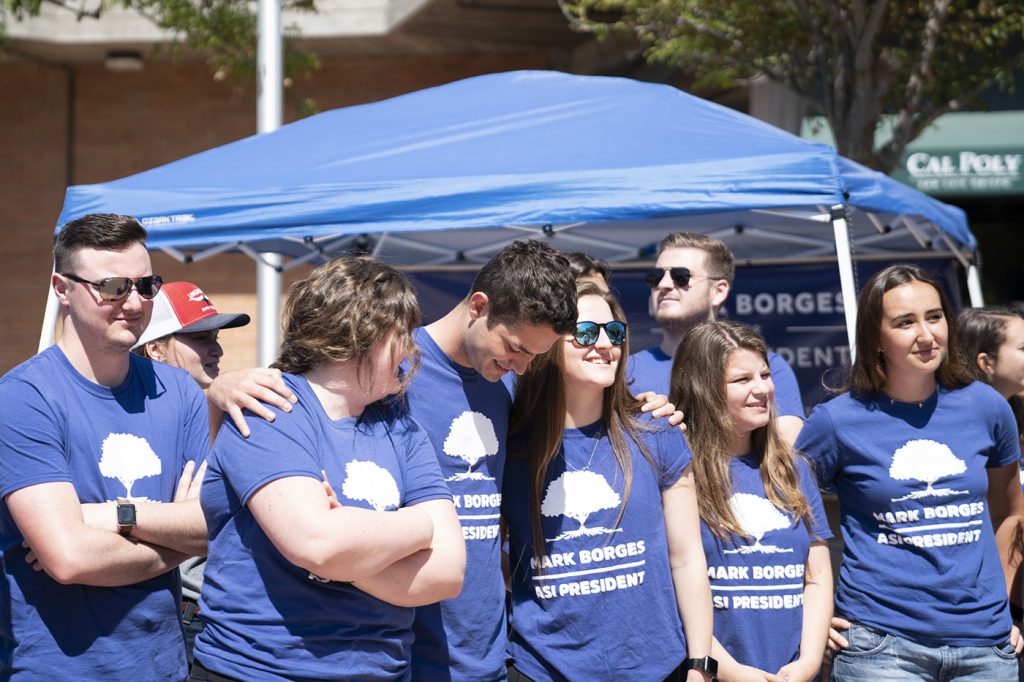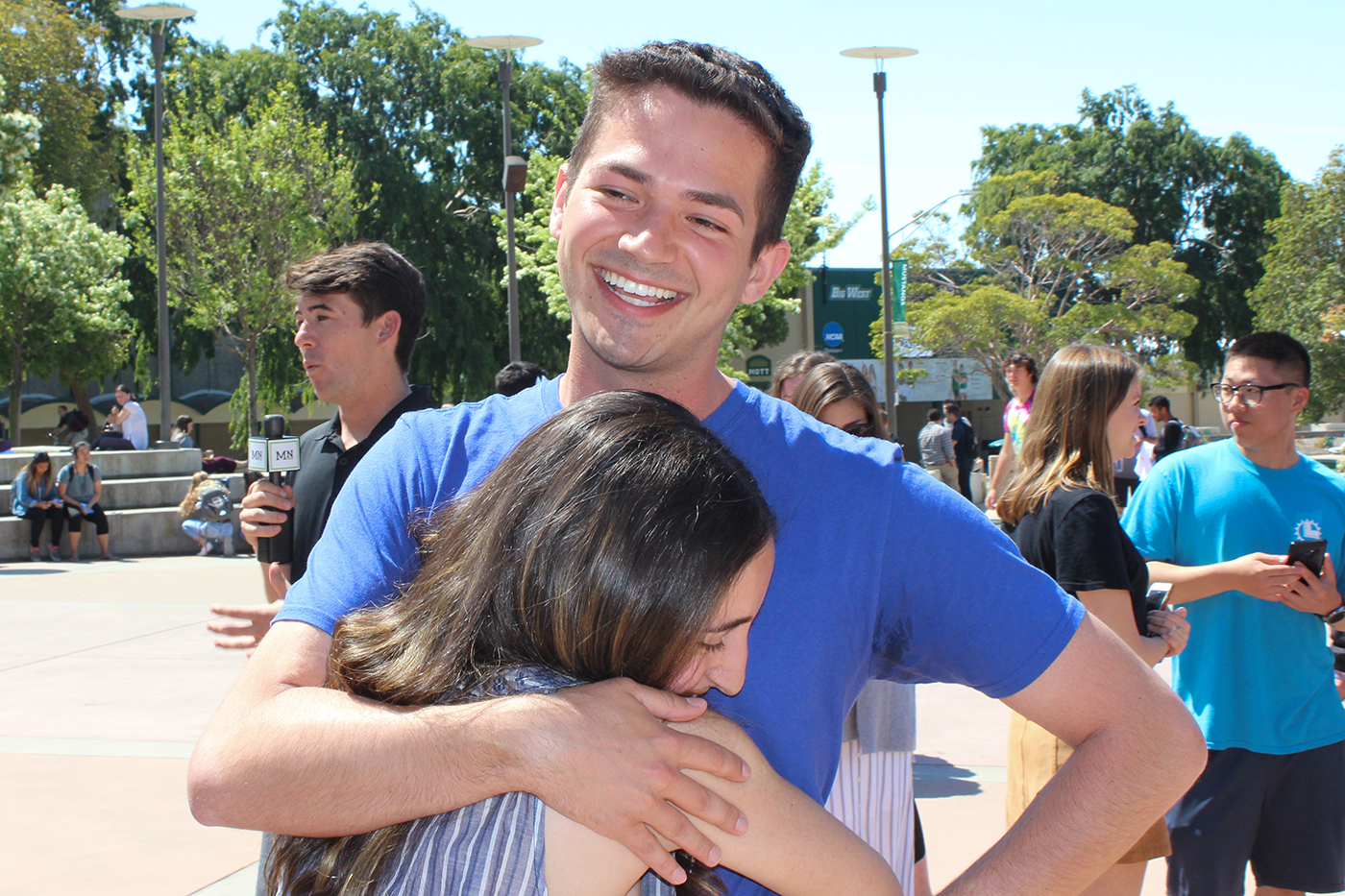As the ASI election results echoed through the loudspeakers of the University Union (UU), Jasmin Fashami’s phone sent her a memory of when her name was announced last year.
“I remember all the people out there with yellow shirts, out there with me holding the buttons, the stickers and cheering for me,” Fashami said. “It was a really great day.”
This year, that moment belonged to Mark Borges, who won the election for ASI president April 25. As Fashami plans to entrust the position to Borges and graduate from Cal Poly, she said the rest of her time as ASI president will be spent focusing on cementing the projects her team started and reflecting on the transformative experience.
“I think once June hits I’ll be a bit more upset,” Fashami said. “Not because I’m being replaced or anything, but seeing this experience end and seeing everything I’ve done finally come to a close.”

Gina Randazzo | Mustang News
A large portion of her commitment to her position is spent building relationships with students, staff and faculty.
“I think a lot of her work is done behind the scenes,” board of directors student engagement committee chair Rob Moore said. “When someone is making a decision about some proposal, Jasmine can be that person that says ‘hey, maybe that’s not what’s best for the students.’”
While Fashami engages with the campus community, much of her job takes place behind closed meeting doors. Her time is spent shuffling between the executive cabinet, board of directors, leadership and officer team meetings. For Fashami, the emphasis of her time as president lied in civic engagement and hearing student concerns.
Much of her efforts have gone toward having a voice in allocating and reserving funds for the Student Success Fee, the Cal Poly Opportunity Fee and Instructionally Related Activity (IRA) fee.
“You have to remind them that people are paying hundreds of dollars to go towards these things, and that’s not something you should take lightly,” Fashami said. “That’s not something where you can just say, ‘oh, well, we need this money.’ It doesn’t work that way.”
“You have to remind them that people are paying hundreds of dollars to go towards these things, and that’s not something you should take lightly”
Fashami seeks transparency in discussing how student funds will be used around campus.
“I like making sure that the money is not being used because someone in staff or administration wants it to be used that way but how it actually goes back and benefits the students,” Fashami said.
Fashami acknowledges that her individual perspective is not enough to represent the broader picture of the campus climate. Holding office hours in several locations of campus, she seeks to collect diverse perspectives and concerns. Questions about skateboarding, transportation and dining are some of the most common topics Fashami hears from students.
One concern Fashami formed from the collective opinions of students is that the university needed a campus-wide mobile app.
“We lack an app that is cohesive and accessible for students,” Fashami said while picking up her phone. “Just making it easier for students to live their life on this device because we are a polytechnic campus and it should be that way.”
This means that students will not have to use separate websites for different campus needs. Involving many departments across campus, Fashami and her team have been discussing new features to implement into the app.
While satisfied with her run, Fashami regrets not taking time to connect more with student clubs and organizations.
“Time management really got the best of me,” Fashami said. “I didn’t anticipate how many hours I would be putting into this role, and I think that trying to balance life, school, and this, I wish I planned a bit better in trying to be more connected to the student body.”
Giving around 40 hours a week to the position, Fashami received feedback saying students lack a direct line of communication with campus figures. She arranged Poly President’s Night, where leaders from student groups on campus could meet with President Jeffrey Armstrong.
“It was so exciting to see people engaging,” Fashami said. “Rarely do people have the opportunity to ask President Armstrong one-on-one a specific question they want to know about.”
ASI Presidents serve for an academic year, but Fashami said it can be very difficult to execute a big initiative within 9 months. The ASI officer team is working on creating detailed recommendations for next year’s team so projects in development can see their way to completion.

Borges plans to continue development on the campus-wide mobile app as well as many of Jasmin’s other efforts. Fashami said Borges’ emphasis on sustainability directly compliments the shift on campus toward being more conscious about the environment. While he has not revealed any term-defining initiatives yet, Borges believes a connection to the student body is an essential factor to becoming a great ASI president.
“I’m one person on campus representing a University of 21,000 undergrads,” Borges said. “I don’t have all of the perspectives of students. So listening to different people’s experiences, factoring in as many social identities as you possibly can so you can represent the student body as much as possible, is so effective for the position.”
Fashami will leave the position when she graduates at the end of this quarter. Fashami said that her journey as ASI president lifted her confidence in herself since being elected in April 2018. Leaving Cal Poly to pursue a law degree, she said she is confident Borges will succeed in the position.
“[Borges] is a smart guy,” Fashami said. “I know he’s going to do a great job next year.”

